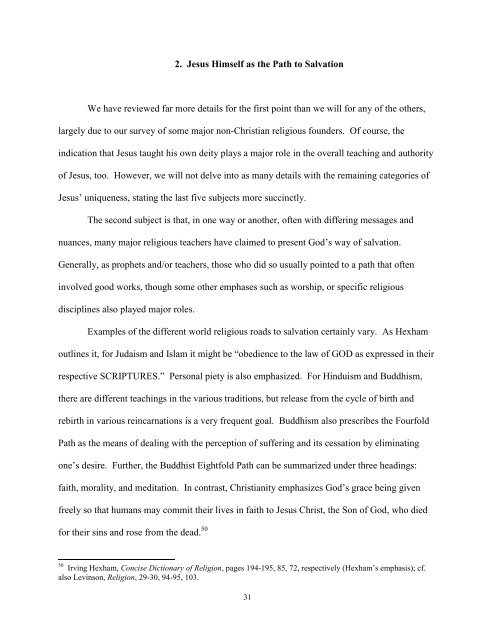Published by
299z7CN
299z7CN
Create successful ePaper yourself
Turn your PDF publications into a flip-book with our unique Google optimized e-Paper software.
2. Jesus Himself as the Path to Salvation<br />
We have reviewed far more details for the first point than we will for any of the others,<br />
largely due to our survey of some major non-Christian religious founders. Of course, the<br />
indication that Jesus taught his own deity plays a major role in the overall teaching and authority<br />
of Jesus, too. However, we will not delve into as many details with the remaining categories of<br />
Jesus’ uniqueness, stating the last five subjects more succinctly.<br />
The second subject is that, in one way or another, often with differing messages and<br />
nuances, many major religious teachers have claimed to present God’s way of salvation.<br />
Generally, as prophets and/or teachers, those who did so usually pointed to a path that often<br />
involved good works, though some other emphases such as worship, or specific religious<br />
disciplines also played major roles.<br />
Examples of the different world religious roads to salvation certainly vary. As Hexham<br />
outlines it, for Judaism and Islam it might be “obedience to the law of GOD as expressed in their<br />
respective SCRIPTURES.” Personal piety is also emphasized. For Hinduism and Buddhism,<br />
there are different teachings in the various traditions, but release from the cycle of birth and<br />
rebirth in various reincarnations is a very frequent goal. Buddhism also prescribes the Fourfold<br />
Path as the means of dealing with the perception of suffering and its cessation <strong>by</strong> eliminating<br />
one’s desire. Further, the Buddhist Eightfold Path can be summarized under three headings:<br />
faith, morality, and meditation. In contrast, Christianity emphasizes God’s grace being given<br />
freely so that humans may commit their lives in faith to Jesus Christ, the Son of God, who died<br />
for their sins and rose from the dead. 50<br />
50 Irving Hexham, Concise Dictionary of Religion, pages 194-195, 85, 72, respectively (Hexham’s emphasis); cf.<br />
also Levinson, Religion, 29-30, 94-95, 103.<br />
31


